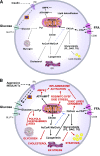Insulin resistance as a physiological defense against metabolic stress: implications for the management of subsets of type 2 diabetes
- PMID: 25713189
- PMCID: PMC4338588
- DOI: 10.2337/db14-0694
Insulin resistance as a physiological defense against metabolic stress: implications for the management of subsets of type 2 diabetes
Abstract
Stratifying the management of type 2 diabetes (T2D) has to take into account marked variability in patient phenotype due to heterogeneity in its pathophysiology, different stages of the disease process, and multiple other patient factors including comorbidities. The focus here is on the very challenging subgroup of patients with T2D who are overweight or obese with insulin resistance (IR) and the most refractory hyperglycemia due to an inability to change lifestyle to reverse positive energy balance. For this subgroup of patients with T2D, we question the dogma that IR is primarily harmful to the body and should be counteracted at any cost. Instead we propose that IR, particularly in this high-risk subgroup, is a defense mechanism that protects critical tissues of the cardiovascular system from nutrient-induced injury. Overriding IR in an effort to lower plasma glucose levels, particularly with intensive insulin therapy, could therefore be harmful. Treatments that nutrient off-load to lower glucose are more likely to be beneficial. The concepts of "IR as an adaptive defense mechanism" and "insulin-induced metabolic stress" may provide explanation for some of the unexpected outcomes of recent major clinical trials in T2D. Potential molecular mechanisms underlying these concepts; their clinical implications for stratification of T2D management, particularly in overweight and obese patients with difficult glycemic control; and future research requirements are discussed.
© 2015 by the American Diabetes Association. Readers may use this article as long as the work is properly cited, the use is educational and not for profit, and the work is not altered.
Figures




Comment in
-
Comment on Nolan et al. Insulin Resistance as a Physiological Defense Against Metabolic Stress: Implications for the Management of Subsets of Type 2 Diabetes. Diabetes 2015;64:673-686.Diabetes. 2015 Oct;64(10):e35-6. doi: 10.2337/db15-0649. Diabetes. 2015. PMID: 26405278 No abstract available.
-
Comment on Nolan et al. Insulin Resistance as a Physiological Defense Against Metabolic Stress: Implications for the Management of Subsets of Type 2 Diabetes. Diabetes 2015;64:673-686.Diabetes. 2015 Oct;64(10):e37. doi: 10.2337/db15-0655. Diabetes. 2015. PMID: 26405279 Free PMC article. No abstract available.
-
Response to Comments on Nolan et al. Insulin Resistance as a Physiological Defense Against Metabolic Stress: Implications for the Management of Subsets of Type 2 Diabetes. Diabetes 2015;64:673-686.Diabetes. 2015 Oct;64(10):e38-9. doi: 10.2337/dbi15-0002. Diabetes. 2015. PMID: 26405280 No abstract available.
References
-
- Inzucchi SE, Bergenstal RM, Buse JB, et al.; American Diabetes Association (ADA); European Association for the Study of Diabetes (EASD) . Management of hyperglycemia in type 2 diabetes: a patient-centered approach: position statement of the American Diabetes Association (ADA) and the European Association for the Study of Diabetes (EASD). Diabetes Care 2012;35:1364–1379 - PMC - PubMed
-
- Tuomi T, Santoro N, Caprio S, Cai M, Weng J, Groop L. The many faces of diabetes: a disease with increasing heterogeneity. Lancet 2014;383:1084–1094 - PubMed
-
- Gale EA. Is type 2 diabetes a category error? Lancet 2013;381:1956–1957 - PubMed
-
- Ruderman NB, Shulman GI. The Metabolic Syndrome. In Endocrinology, 6th ed. De Groot LJ, Jamieson JL, Eds. Philadelphia, Elsevier, Saunders, 2010, p. 828–839
Publication types
MeSH terms
Substances
Grants and funding
LinkOut - more resources
Full Text Sources
Other Literature Sources
Medical

